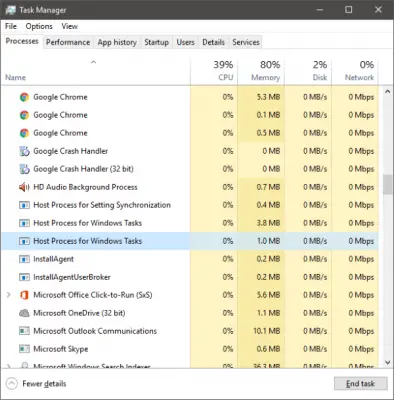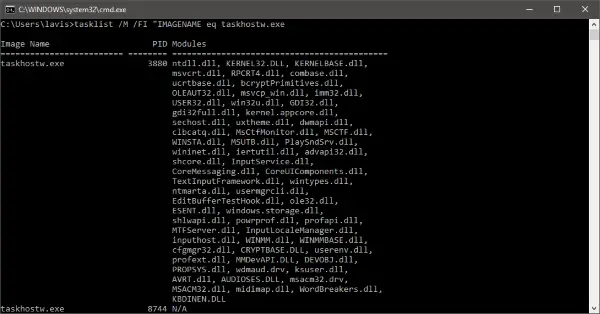Whenever nosotros confront approximately performance issues amongst our computer, the commencement matter nosotros create is opened upwardly up the Task Manager, too and thus expect for the applications or components which are using the most resources. If yous are familiar amongst Task Manager, too thus yous must convey also noticed that at times, the ‘Host Process for Windows Tasks’ or ‘Service Host’ procedure consuming resources. What these processes too what tin yous create if your Host procedure has stopped working or consumes high CPU, Disk or Memory usage.
Host Process for Windows Tasks
Windows is essentially working simply because of its Services. Influenza A virus subtype H5N1 large number of services running the background facilitate your daily tasks too operations. Some of these services are compiled into EXE files, too they are consummate inward themselves. These services present upwardly inward the Task Manager. But approximately services are written inward DLL files, too they cannot hold upwardly executed directly. Microsoft shifted to DLL files every bit they were tardily to hold too update from a programming indicate of view. DLL services require a host process, an EXE that tin execute them too this is what ‘taskhost’ inward Windows is.
Taskhost inward Windows 10 is a gist file located inward the System32 folder too has been renamed every bit ‘taskhostw.exe’, from ‘taskhost.exe’ inward Windows 7. If yous uncovering a file amongst this yell inward whatsoever other location, it could good hold upwardly a virus too yous powerfulness desire to larn it checked amongst your safety software.
Each ‘Host Process for Windows Task’ is an instance of ‘taskhost’ running approximately service inward the background. Although Windows Task Manager does non precisely permit yous persuasion what services it is running, other tools can.
Host Process for Windows Services has stopped working or consuming High resources
If yous encounter a ‘stopped working' mesage box,you tin effort the next troubleshooting suggestions:
- Open Task Scheduler. In the left pane, click on Task Scheduler Library > Microsoft > Windows> RAC. Next, click the View Menu too direct Show Hidden Tasks. In the middle pane, correct click on RAC Task too click Disable. See if this helps. If not, opposite the modify made.
- Open Event Viewer too direct the latest Application consequence log inward the left pane which has a cherry-red mark. Double-click an consequence to persuasion the details of the event. See if yous uncovering whatsoever useful data here.If it displays Host procedure for Windows has stopped working message, it could help.
- Perform Clean Boot too troubleshoot the number manually.
There powerfulness hold upwardly times when yous uncovering that this procedure is using high resources. You tin at nowadays empathize that this is caused due to the underlying service too non the procedure itself. Also, yous powerfulness notice high consumption of resources at Windows startup. That is simply because the taskhost is loading all the DLL files too scheduling to run them. Once it is completed, the usage volition settle downward to a lower value too volition stay pretty depression for residual of the time.
I mentioned before that the Task Manager does non permit yous persuasion the underlying services. But yous tin usage Process Explorer from Microsoft to persuasion the services beneath the taskhost. It is a portable utility, too yous tin run it straight afterwards downloading. You tin usage this tool to persuasion all the details associated amongst the taskhost.
Find ‘taskhostw.exe’ inward the left pane, too yous tin read all the details inward the lower pane. Another agency to persuasion the listing of DLL files loaded past times taskhost is past times typing inward the next ascendence inward a cmd window:
tasklist /M /FI "IMAGENAME eq taskhostw.exe
This ascendence volition listing all the DLL files that were loaded past times this procedure on Windows Startup. If yous larn through the list, yous volition uncovering out approximately essential files that render gist functionality to Windows.
So, inward a nutshell, Taskhost is a core Windows process that provides functionality to charge too execute dynamic link libraries. Since it hosts diverse DLL files, sometimes it tin eat resources at a to a greater extent than than normal rate. If yous are facing whatsoever such issues where the procedure has stopped responding or is using a lot of resources. Use the Process Explorer, Performance Monitor too Resource Monitor, too effort to troubleshoot the occupation manually.
Want to know nearly these processes, files or file types?
Windows.edb files |csrss.exe | Thumbs.db files | NFO and DIZ files | Index.dat file | Swapfile.sys, Hiberfil.sys & Pagefile.sys | Nvxdsync.exe | Svchost.exe | RuntimeBroker.exe | TrustedInstaller.exe | DLL or OCX files. | StorDiag.exe | MOM.exe | Host Process for Windows Tasks | ApplicationFrameHost.exe | ShellExperienceHost.exe | winlogon.exe | atieclxx.exe | Conhost.exe | mDNSResponder.exe.
Source: https://www.thewindowsclub.com/




comment 0 Comments
more_vert